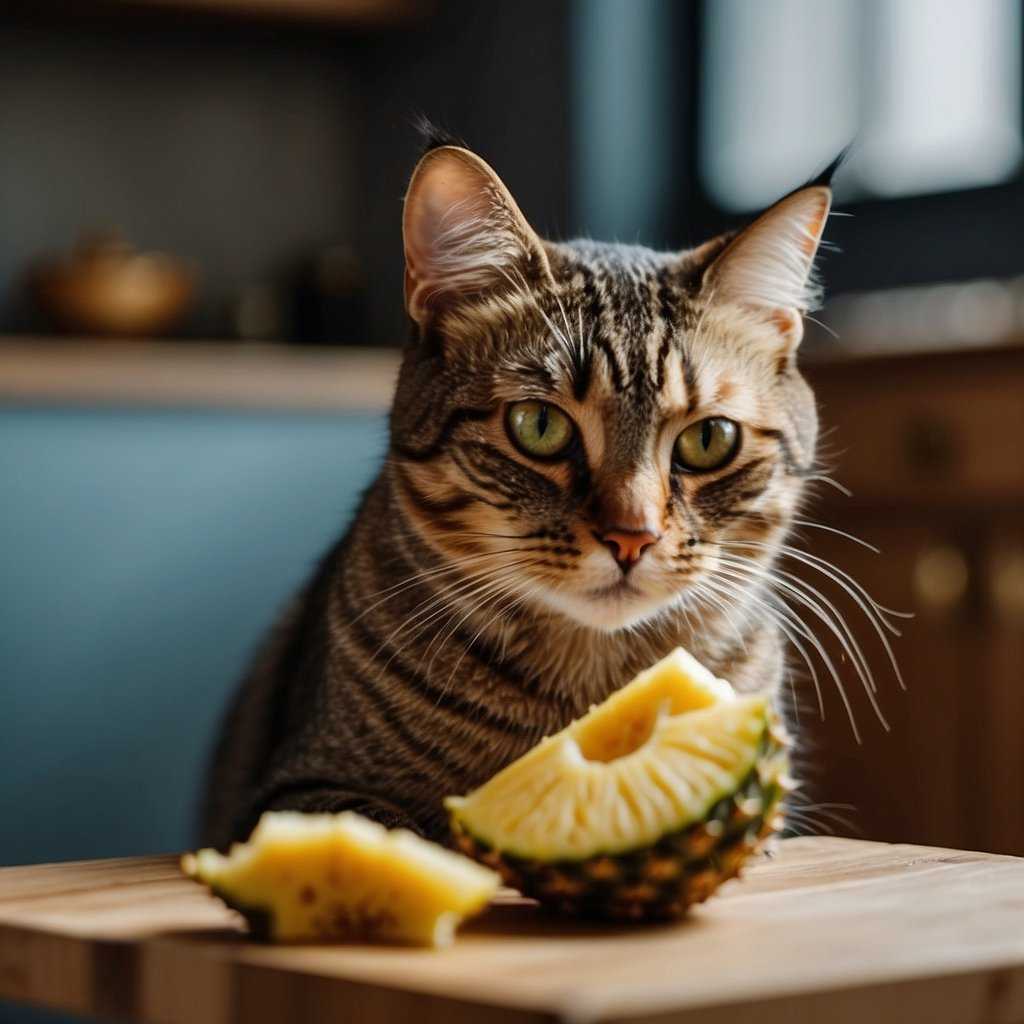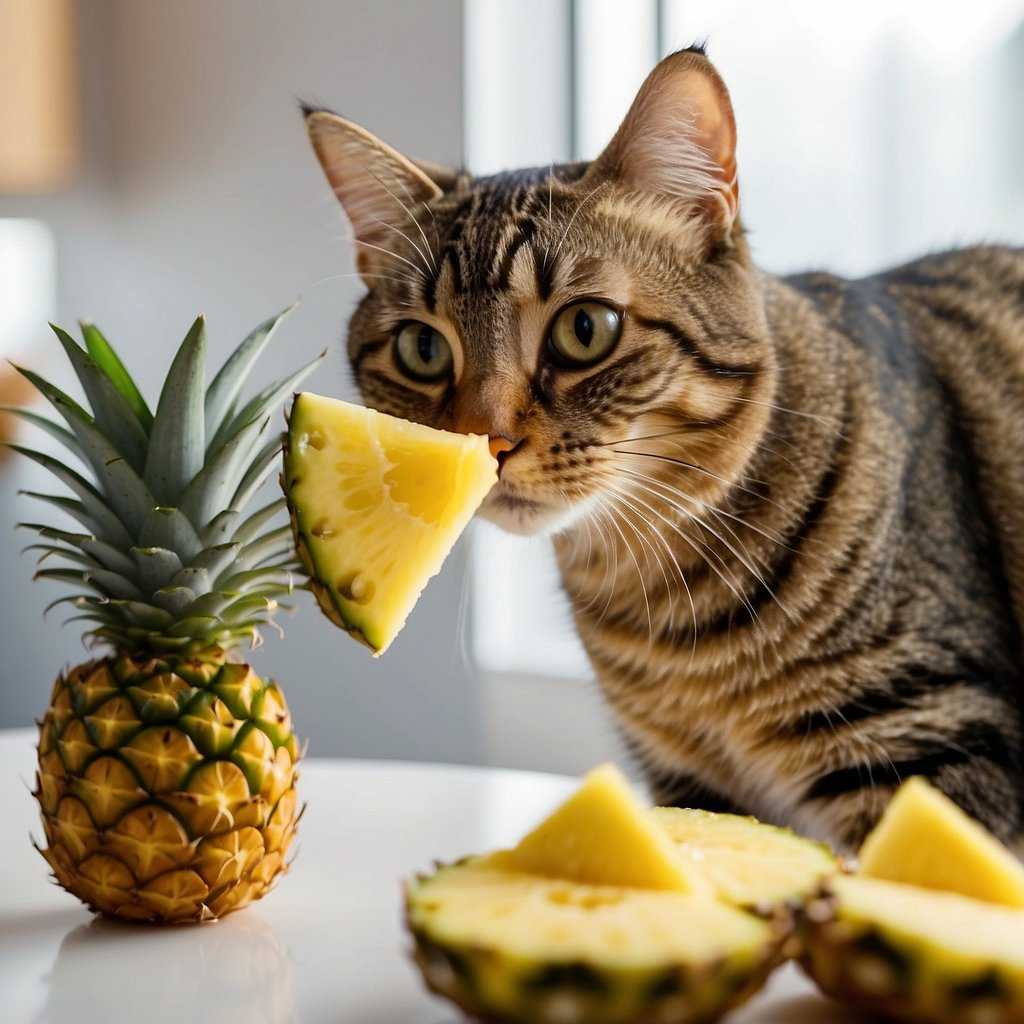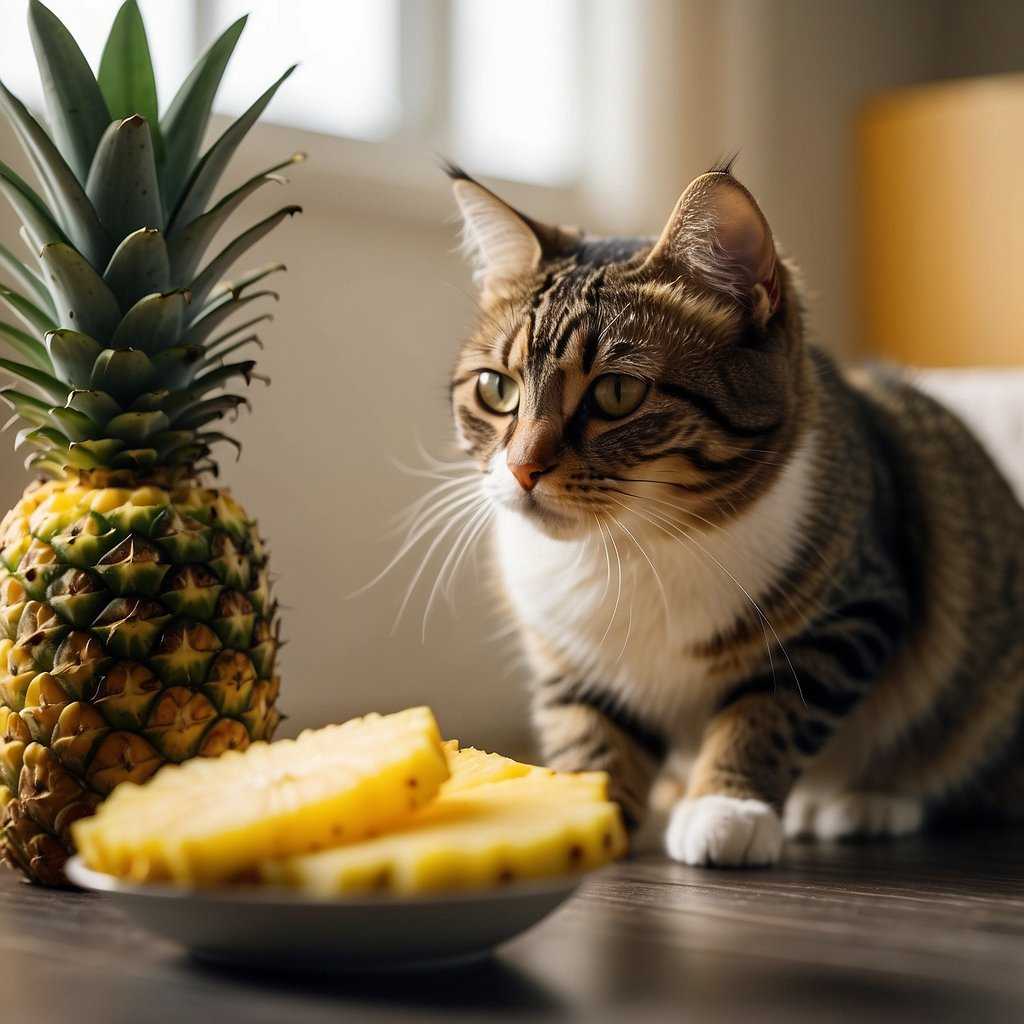Have you ever spotted your feline friend eyeing your snack of juicy pineapple and wondered if a little taste would be okay?
As cat owners, we’re often curious about which human foods are safe for our pets. The good news is, cats can indeed nibble on pineapple.
Yet, this sweet, tropical fruit is quite the departure from their carnivorous diet, so moderation is key.

Like us, cats can have varied taste preferences and health needs.
Pineapple is not toxic to cats and provides some vitamins and minerals, including fructose, but its high sugar content means it can’t substitute for their regular diet.
If you’re considering pineapple as a treat, it’s important to ensure it’s given in small, properly prepared cubes.
Now, let’s cut to the chase and find out how best to offer your kitty this exotic delicacy without causing any tummy upsets.
Remember, keeping treats unusual and safe, without any preservatives or thorns, is the secret to a happy, healthy cat!
Key Takeaways
- Pineapple is safe for cats in small portions.
- It’s important to remove the tough core and skin before offering pineapple to your cat.
- Moderation is essential as pineapple’s high sugar content is not ideal for cats.
- Other human foods that contain high sugar are not suitable for cats.
Can Cats Eat Pineapple?
Ever wondered if you could share a slice of that sweet pineapple with your cuddly feline friend while you enjoy your tropical snack? The good news is, you can—in moderation, of course.
Safety and Suitability: While pineapples are not toxic to cats, they are sugary and should be an occasional treat rather than a dietary staple. Here’s a quick rundown:
- Fruit in a Cat’s Diet: Cats are obligate carnivores, meaning their diet should primarily consist of meat. However, a small fruit snack won’t hurt. (1)
- Taste Preferences: Unlike us, cats typically aren’t fans of sweet flavors — they lack sweet taste receptors.
- Moderation is Key: Keep the portions small. How small? Think about the size of a dice.
Pineapples are juicy and rich in vitamins A, B, and C, as well as manganese, but cats have specific nutritional needs that pineapples don’t meet. (2)
Feeding Tips:
- Only offer the flesh of the fruit, avoiding the hard center, skin, and leaves.
- Watching your kitty chomp on pineapple can be cute, but keep an eye out for any digestive upset.
Remember, your cat’s main course should always be nutritionally complete cat food. Treats like pineapple should only be the cherry—or should we say, pineapple—on top!
Have a chat with your veterinarian before introducing any new treats to your pet’s diet. A vet’s advice is a golden nugget in ensuring your furball’s health and happiness.
Ready to share a tiny tropical treat with your cat? Go ahead, just remember: tiny!
Understanding Pineapple’s Nutritional Value for Cats
Hey there, cat lovers! Have you ever wondered if your furry friend can enjoy the tangy sweetness of pineapple? Let’s dive into what pineapple offers to your kitty’s diet.
Nutritional Profile of Pineapple:
Pineapple is a tropical fruit loaded with several vitamins and minerals, but are they what your cat needs?
- Vitamin C: Cats produce this on their own, so additional sources are not necessary. (3)
- Vitamin B6: Useful for bodily functions, but cats require this vitamin in very small amounts. (4)
- Manganese: A trace mineral that supports metabolism and bone health, which can be beneficial.
Cats’ Nutritional Needs:
Your cat’s diet should primarily consist of protein from meat. They are obligate carnivores, which means they derive their nutrition mainly from animal products.
The nutrients in pineapple are not part of a cat’s natural dietary requirements.
Potential Benefits:
- Fiber: A moderate amount could aid in your cat’s digestion. But remember, too much of a good thing can be trouble!
Risks and Precautions:
- Sugar Content: Pineapple packs a sugar punch. A diet high in sugar could lead to obesity or diabetes in your cat. Moderation is key!
| Nutrient | Found in Pineapple | Cat’s Requirement |
| Vitamin C | Yes | No |
| Vitamin B6 | Yes | Minimal |
| Manganese | Yes | Minimal |
| Sugar | High | Low |
When it comes to your cat’s health, the risks often outweigh the benefits. If you do decide to treat your cat to a nibble of pineapple or dry food, keep portions small and infrequent.
If you notice any unusual symptoms after your cat eats pineapple or dry food, including citrus fruits, it’s best to consult your vet to avoid cat digestive issue. Your fluffy friend’s safety should always come first!
Feeding Pineapple to Cats: Best Practices
Ever wondered if your furry pal could join you in enjoying a slice of pineapple? They can, in moderation! Here’s how to share this tropical treat safely with your kitty.
How to Prepare Pineapple for Cats
Follow these simple steps:
- Choose a fresh pineapple. Ripe ones are best, as they’re the sweetest and softest!
- Peel the pineapple and remove any spiky skin, as it’s tough and inedible for cats.
- Cut the pineapple into tiny, bite-sized pieces to prevent choking hazards.
- Offer a small piece to your cat as a taste test.
Remember, cats are obligate carnivores, so fruits, vegetables, and nuts should only be a tiny part of their diet.
Monitoring Cat’s Reaction to Pineapple
Just like us, cats can have individual tastes and allergies. Keep an eye on your cat for any unusual behavior or physical reactions such as:
- Sneezing or coughing
- Pawing at their face or mouth
- Signs of gastrointestinal discomfort (e.g., vomiting or diarrhea).
If you spot these signs, discontinue feeding them pineapple and chat with your vet.
Consulting a Veterinarian
Wonder when it’s time to ring up the vet? Here’s a quick rundown:
- Before you introduce any new food to your cat’s diet, especially if your cat has a history of food sensitivities or allergies.
- If you observe any adverse reactions post-pineapple tasting.
Vets are your go-to for personalized advice, ensuring your cat stays healthy while exploring new foods.
So there you have it—pineapple can be a sweet little extra for your cat, just make sure it’s a rare treat rather than the main event!
Alternative Treats and Nutrition for Cats
Fancy a fruity treat for your feline friend? While pineapples can be a hit or miss, there’s an array of safe fruit options that your kitty might just paw-sitively enjoy. Let’s dive into some juicy alternatives!
Safe Fruits for Your Cat:
- Melon: Hydration hero!
- Blueberries: Tiny antioxidant bombs.
- Apples (without seeds!): Crunchy goodness.
Remember to serve these fruits in moderation—think tiny, bite-sized portions.
Wondering about nutritional supplements? Cats thrive on a balanced diet, and commercial cat food is typically crafted to meet all their dietary needs.
However, if you’re considering supplements, it’s a topic best discussed with your vet to ensure they’re tailored to your pet’s specific health requirements.
Balance is key, and it’s essential to blend the following into your cat’s diet:
- Protein: The cornerstone of a cat’s diet.
- Taurine: An essential amino acid.
- Vitamins: A, E, and B-complex support overall health.
- Water: Cats can be finicky drinkers, so wet food helps with hydration.
A quick note on the waterfront: Cats aren’t big on having a sip now and then, right? Wet food can be a secret hydrating agent, so consider incorporating it into your diet.
So, while you might not find a feline fruit fanatic in your home, knowing you have safe fruit options like watermelon and a balanced diet plan gives you the purr-fect blend of options for your cat’s health and enjoyment.
Pet parents should always be in the know when it comes to what cats can and can’t eat.
Pet parents should keep portions small, diet balanced, and always consult with your vet before introducing new foods like watermelon and beta carotene to your kitty’s menu. Happy feeding!
Deepening the Content with Veterinary Insights

Have you ever caught your fluffy companion eyeballing your juicy slice of pineapple and wondered if it’s a treat they can enjoy?
Well, veterinarians counsel that cats can indeed nibble on pineapple, but, like any indulgence outside their regular diet, there are some purr-tinent points to consider.
Cats are obligate carnivores, which means their diets should be largely protein-based, specifically animal protein. (5)
Fruits like pineapples are safe for cats in small doses, but they don’t offer the full nutritional profile cats require.
Yet, if your furball is a little adventurous in their taste, a small piece of pineapple can be a sweet treat.
However, it’s important to remember that cats’ natural diet consists of animal protein, so plant matter like pineapple should not be a significant part of their regular diet. (6)
Veterinary insights further emphasize that cats don’t need to consume plant matter or calories.
Nutritional Adequacy:
- Manganese: Aids in protein digestion
- Folate & Copper: Essential for producing red blood cells
Nevertheless, caution is key. Pineapples are sugary and can lead to stomach upset or obesity if fed in large quantities. Also, the exotic fruit’s acidity might not agree with every kitty’s tummy.
Feeding Guidelines:
- Offer small quantities: Prevent digestive and health issues
- Introduce slowly: Avoid upset stomachs
Remember, each cat is unique, and their reactions to new foods can vary. Before introducing any new food, including pineapple, have a chat with your vet—better safe than sorry, right?
Veterinary Quotes:
“Pineapple is non-toxic to cats, but it’s high in sugar and should be an occasional treat rather than a regular part of their diet.” – The Vets
In summary, as with any good thing, moderation is crucial. A tiny taste of pineapple can be a delightful change for your cat’s palate, but their regular menu should remain firmly in the realm of proteins.
Keep the fruit to a minimum, and you’ll have a happy and healthy feline friend! 🐱💖
Enhancing User Experience and Engagement
Have you ever wondered if your furry little friend can indulge in some pineapple without any fuss?
To keep you engaged and informed, let’s break this down with some interactive elements that you’ll surely find both fun and useful.
Interactive Infographics: Let’s start with something visually appealing – a colorful infographic on cat nutrition.
Imagine a vibrant chart that points out where pineapple fits into your cat’s diet. Yes, that tiny, juicy segment is all the pineapple your cat should have!
FAQ Corner: Got more questions? How about a dedicated section? Here’s a little table that quickly addresses some common concerns cat owners have about cats and fruit:
| Q: | Can my cat eat pineapple? | A: | In moderation – a small piece occasionally. |
| Q: Will pineapple harm my cat? | A: Too much can lead to tummy trouble, so be cautious. | ||
| Q: Are the leaves or skin safe? | A: Not at all – stick to the flesh, and avoid processed sugars. |
Now, while we’re chatting, remember not to let your cat make a meal out of pineapple – it’s a treat, not a main course.
Here’s a little joke to keep things light: Why did the cat sit next to the pineapple? I wanted to try being a purr-napple for a day!
This engaging mix of visuals, timely questions, and some lighthearted humor ensures that you’re not just reading; you’re experiencing the content.
Keep this handy the next time your kitty eyes that juicy pineapple slice – a bite won’t hurt, as long as you keep it small and ripe!
Quick Recap

Hey, cat owners! Ever wondered if your feline friend can nibble on some pineapple? Well, here’s a brief scoop on what you need to know:
- Can Cats Eat Pineapple? Yes, in moderation some fruits can be eaten by cats. Pineapple is not toxic to cats, but it’s crucial to remember that cats are obligate carnivores. So, the core of their diet should be high-quality meat.
- Nutrients in Pineapple: Pineapple does offer nutrients like magnesium, vitamin B6, and copper, which might have health benefits for your kitty.
- Cats’ Taste Preferences: Your furball might not crave pineapple since cats can’t taste sweet flavors. Honestly, they might just be curious about what you’re munching on.
- Owner’s Responsibilities: It’s your job to ensure treats like pineapple are given occasionally and in small amounts. Watch out for the sugar content!
How to Serve Pineapple to Cats
- Quantity: Small, bite-sized pieces.
- Frequency: Only as an occasional treat.
- Preparation: Fresh and without the tough core or spiky skin.
| Potential Benefits | Precautions to Consider |
| Manganese | High sugar content |
| Vitamin C | Potential digestive upset |
| Fiber | Allergic reactions |
Remember, if you’re ever uncertain or your pet has a unique health condition, your vet is just a call away for personalized advice.
For those who want to dig deeper into the whys and hows of feline nutrition, numerous vet-approved sources are available online.
They can provide a wealth of information on how to keep your curious cat both happy and healthy.
Frequently Asked Questions
What are the signs of pineapple allergy in cats?
If your cat sneezes or itches more than usual after a pineapple treat, they might be allergic. Gastrointestinal upset is another red flag to watch for.
How often can I safely give my cat pineapple?
Treat your cat to pineapple sparingly. A small piece once in a while is enough to keep it special and safe.
Are there any benefits to giving cats pineapple?
Pineapple contains nutrients like manganese and Vitamin B6. However, your cat’s main diet should provide all the necessary nutrition.
Can kittens have pineapple, or is it just for adult cats?
Generally, it’s best to keep pineapple off the menu for kittens. Their digestive systems are still developing and more sensitive.
Is canned pineapple safer or healthier for cats?
Canned pineapple isn’t recommended for cats due to its high sugar content. Go for fresh, raw pineapple without the syrupy sweetness.
Will pineapple change my cat’s behavior or eating habits?
Not likely, but if pineapple becomes a frequent treat, your cat might start expecting sweet snacks more often. Moderation is the key!


